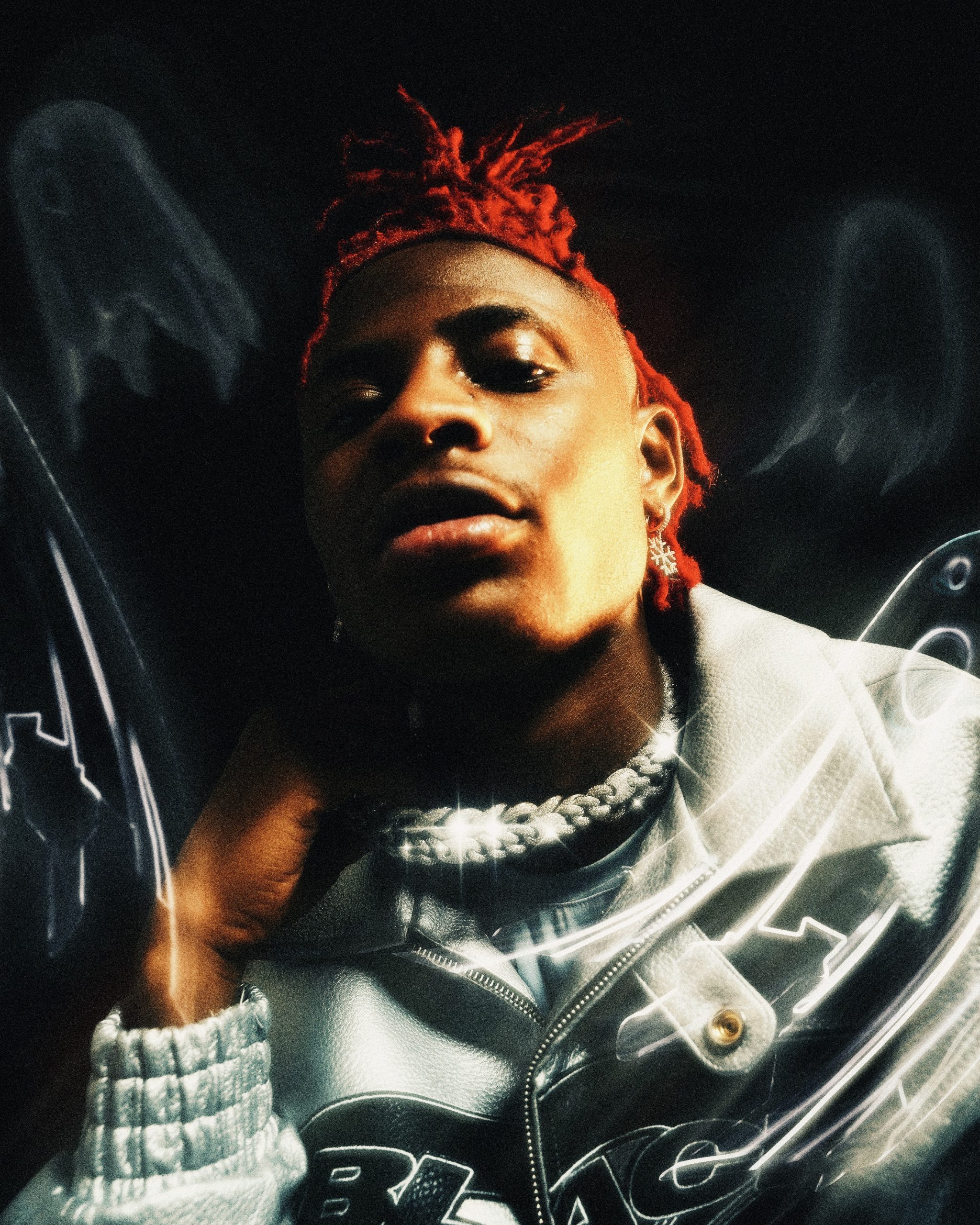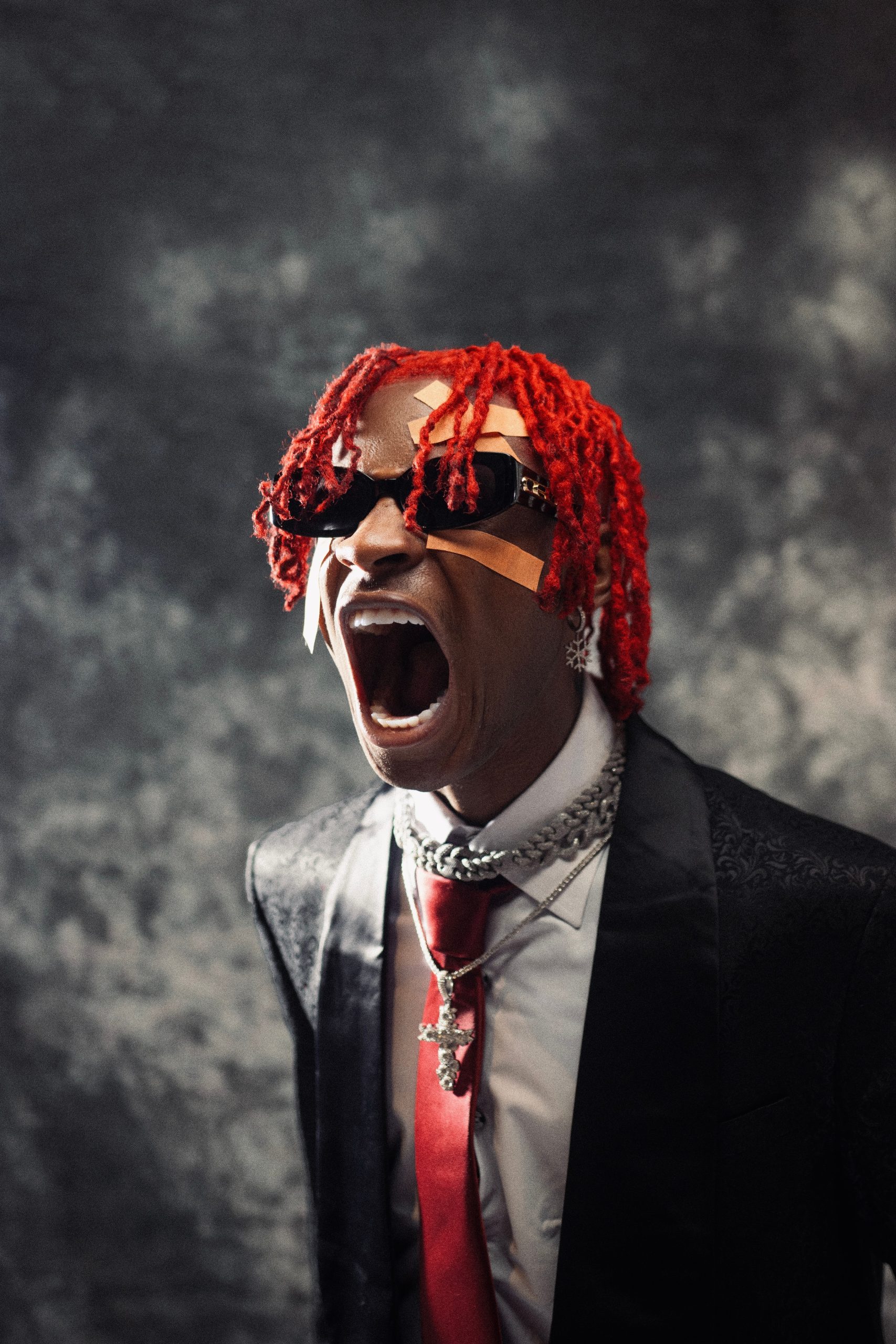Faith, Freestyles, and Fame: Khaid’s Meteoric Rise to Global Teen Sensation
Khaid wants listeners to find therapy, lightheartedness and healing through his music.
Khaid wants listeners to find therapy, lightheartedness and healing through his music.
When Khaid jumps on our Zoom call on a cozy Thursday afternoon, I immediately notice his red dreadlocks, a shock he definitely intended to evoke with the bright contrast from his previous duotone of black and off-white. “I think red has always been my thing. Like this, when I walk in the room, everyone is like ‘who the hell is that guy?’” he says with a chuckle.
Religion has always been an anchor – and perhaps the most influential crucible – in Afrobeats, and Khaid is no stranger to the confluence of religion and music. Born Sulaimon Shekoni Solomon, and raised in a Christian-Muslim household of ten, hope was a heavy tenet of Khaid’s formative years and music offered him the creative outlet he dearly desired. “I started off rapping. I used to think singing was mainly for females, you feel me? At a particular time, I discovered that these people that were singing were so talented and creative, so I started trying it and I just got better and better,” he recalls honestly.
A native of Ojo, a South Lagos suburb steeped in Yoruba tradition and renowned for both its trade industry and its music stars, Khaid – which he pronounces as /Keid/ like cake with a d – found his early path in a vocational trade. At age 14, while his artist dreams picked up steam off freestyles that became popular throughout neighbouring locales, he picked up the practice of fixing cars under the stewardship of a roadside mechanic, and lived out his fantasies through social media, idolising the artistry of Juicewrld, XXXTentacion, and Lil Durk. “The power of the mind is one of the most underrated things. People don’t believe in their mind. They don’t believe in their intuition. As powerful as it is to walk physically, that’s as powerful as it is to walk spiritually, too. The mind is a big space where everything can come to life in an instant,” he says with so much conviction that you can almost see his belief through his plain white shirt and prim jumper.
It wasn’t long before his mental fortitude was rewarded and his many fantasies turned reality. By January 2022, 17-year-old Khaid was announced as Neville Records’ premier artist under the tutelage of internet sensation, Sydney Talker. Sydney had discovered Khaid through one of his many freestyles on Instagram, one year before.

“Social media has done a lot of good for me, not like it hasn’t caused me harm, but it has done a lot of good. I can’t imagine how it would be if there was no social media,” he says, acknowledging the complex bedrock behind his growing influence. “It has helped me push my music harder and just give me more exposure and with social media, you have to be smart about what you are doing.”
TikTok in particular, helped cement his debut single, “With You”– released eight days after his label signing – as one of the romance anthems of 2022. The fresh-faced beady-eyed teenager was a sensation on arrival. By May, he’d released his debut EP, “Diversity”, a six-track mesh of trap and Afrobeats pillowed with youthful exuberance that served as a full-fledged foundational iteration of Khaid’s artistic fantasies.
2023 sealed Khaid as a music industry mainstay. He started the year with the shimmery RnB number, “Jolie,” and then followed with a succession of critically-acclaimed party-starters, “Carry Me Go” with Boy Spyce, and “Annabella.” Later that same year, he released a six-track sophomore EP, ‘Emotions’ before capping the year off with a much-awaited linkup with one of his idols, Lil Durk, and a nomination for Rookie of the Year at the 2023 Headies in Atlanta. “I had no idea I was that big outside Nigeria. I get a little boxed in, sometimes. For me, no matter how big or no matter how little the crowd is, you just need to have that heart of appreciation. I can see my songs are healing people, getting them through some tough times, and just keeping them happy, and it really makes me glad that I’m doing something to help people. Music is therapy, that’s the highest form of therapy. I feel like a therapist right now,” he says jokingly before affirming God as his therapist when I ask who he runs to for help.
Primed for an explosive 2024, and flying high off backlift collaborations with fellow newcomers Gyakie, Tar1q, then spinning the block with Boy Spyce within the first quarter of the year, Khaid encountered his greatest setback yet – himself. He was hospitalised, reportedly for internal bleeding. His faith carried him through the tumultuous four-month ordeal which he barely speaks about over the course of our forty-minute chat. “It’s so crazy having someone tell you not to go to sleep until they approve. That’s what I was talking about on “I Don’t Wanna Die”, he explains. “I’m grateful for living and having life. I think what’s keeping me excited right now is my relationship with God and how my faith has grown.”

On the artwork for his latest EP, ‘444’ – released weeks after he was discharged from the hospital — a grim red aesthetic is emblazoned with a bright cross centred on Khaid’s forehead, signalling his Christian faith and possibly protection from higher powers. “Red is just intense. Pink is actually my favourite colour but red is intense. I think I have a lot to do with red in the future,” he muses. Red has long been splattered across Khaid’s visual aesthetic, but it takes its most daring form yet on ‘444’ casting him as a resilient fighter bleating out a war cry. “This EP is the road to the album. 444 has three meanings,” he explains “The first meaning of 444 is trusting in your intuition. The second meaning is your guardian angel watching over you. The third meaning is that God created the main components of the earth, the sky, the sun, the moon, on the fourth day.”
The three-track EP features a highly-coveted guest verse from rap legend and music mogul, Olamide, which Khaid credits to the power of social media. “I just went on Twitter [now X] and tagged Baddo in a tweet, and he replied. I didn’t even reply on time yet he replied quickly. Even my guys aren’t that quick with replying me,” he jokes. “From there, we just spoke. You know when Baddoo is speaking, you listen and jot things. He just showed me love. I haven’t even met him till now, so I’m like, what if I meet him, how is it going to be?” A week after my conversation with Khaid, a video surfaced on social media of him and Olamide making a Tiktok to their track, “Way Back.”
@Olamide rapper with the hardest melodies😮💨‼️.
Respect Grand chief🙌🙇🏽♂️.— little snow☃️ 444 (@khaidxr) November 29, 2023
BOG BADOO IS ACTIVE‼️‼️.@Olamide pic.twitter.com/tPclSP0gbI
— little snow☃️ 444 (@khaidxr) July 29, 2024
OLUWANISHOLA. pic.twitter.com/FFpjzA7hDN
— little snow☃️ 444 (@khaidxr) July 30, 2024
‘444’ is arguably Khaid’s most reflective project yet. Battered by adversity and energised by the awakening of new-found purpose, the 19-year old artist showcases a deep well of versatility, channelling his angst and pain with a familiar cadence and introspective messaging. Although he doesn’t believe in traditional therapy, Khaid wants listeners to find therapy, lightheartedness and healing through his music. Armed with a brand new outlook on life, he cranes to become a source of self-love and a ray of hope to the many children across Ojo and beyond, relying on music for solace. “I just want people to know that as big and as good as the world is, there is still a lot of pain in the world. As sad as it may sound, the music is basically talking about self-love. I want to leave a stain of self-love. I just want them to look at me and say that guy really gave us hope.”

